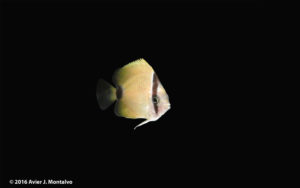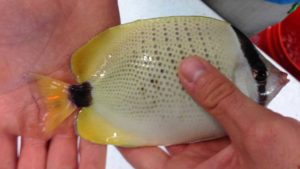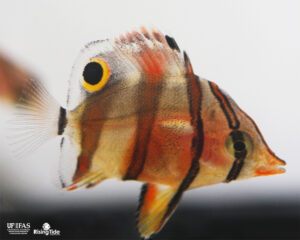Let’s get the bad news out of the way first. We lost our last remaining milletseed butterflyfish larvae at 44 dph (days post hatch).
The good news is we’ve gained ample insight into the larval stages of milletseed butterflyfish and can now identify where bottlenecks in development are occurring. With this knowledge we can address the parameters at these critical junctions. We currently have another batch of larvae at 25 dph and others coming up behind that.
Additionally, two of our current populations are spawning twice weekly and data on fecundity, fertilization rates, hatching success, and survival are being gathered from each spawn. From information obtained in our last trial, we now know that larvae can feed on copepods throughout development and that we witnessed mortality events around 11, 20, 27, and 35 dph. Addressing these bottlenecks is our priority. It appears that swim bladder inflation is occurring approximately 11 dph and may be associated with our first mortalities. We also know that flexion is beginning around 27 dph with completion occurring by 30 dph. At this time, body depth increases dramatically. After approximately 38 dph, the tholichthys larval stage (a stage where large calcified head plates form) begins to recede however the preopercular spine and an opercular plate remain.
We hope to address these mortality issues through a variety of replicated studies investigating different parameters such as nutrition, light requirements, water flow, and settlement cues. Our goal is to understand the effect of each variable we test and optimize aquaculture techniques for the milletseed butterflyfish.
The Rising Tide Team at the Tropical Aquaculture Laboratory



